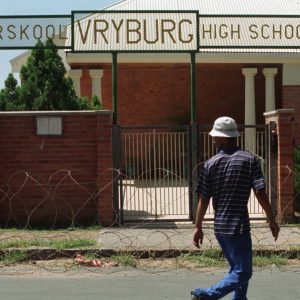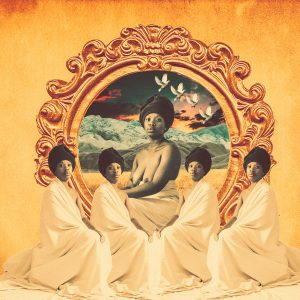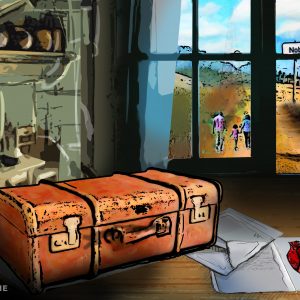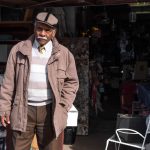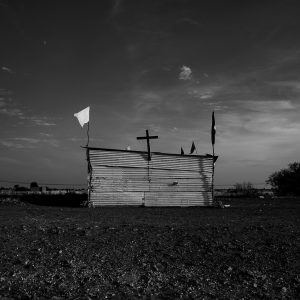Long Read | Part two: Growing up in KwaSizabantu
Nontobeko Hlela tells the story of her life as a senior pupil at the KwaSizabantu mission school and how she struggled to adapt to university life in the second of this highly personal, two-part se…
Author:
7 October 2020

The evangelical KwaSizabantu Mission was founded in 1970 in rural KwaZulu-Natal. It has been accused of violence, human rights abuses, sexual assault, complicity with the security apparatus of apartheid regime and financial mismangement in a News24 investigation.
Nontobeko Hlela was the head girl of the Domino Servite School at the mission in 1995 and this is her story.
We were told relentlessly that there is only one way to God and that is the KwaSizabantu way. All other churches and other ways of worshipping are not right. There is only one way, and that is the KSB way.
We never had any real contact with my extended family as none of them went to the KwaSizabantu Mission. They were deemed to be heathens and we had to keep away from them. If a person left the mission, they were referred to as having fallen and having backslid and we were not allowed to talk to or see that person again. Leaving the mission wasn’t just turning your back on it, it was turning your back on God.
I was scared of God because all we ever heard about was the punishment and wrath of God, and how the evil will be roasted in hell and the smallest thing could mean that you were a sinner. There were a lot of rules and things you had to abide by.
Dancing, wearing make-up, pants or nail polish, talking to a boy, long hair if you were a black woman – because white women and girls could grow their hair long and do all types of hairstyles – and having “bad thoughts”. Clapping your hands in time to music, swaying to music, watching television and listening to the radio were all sins.
All this made you evil and you would burn in hell for it. Later, they had Radio Khwezi, a community radio station based at the mission, and this was the only radio station that could be listened to. It’s ironic that aQuellé, the bottled water company, now owned by the mission, sponsors events where people are scantily clad and screens adverts on television.
Related article:
One year, in standard 6 or 7, we almost didn’t write our final exams. As we were revising for our maths paper, our teacher, Mr Hlongwane, used a practical example of statistics and percentages. He asked us to tell him how many of us were (1) at the school because we wanted to be, (2) how many were there because their parents sent them there, (3) how many would, of their own free will, choose to be there now that they were there, and (4) how many wouldn’t choose to come to the school.
Only the white kids in our class, whose parents were either teachers, co-workers or the children of mission founder Uncle Erlo Stegen, said they would choose to come to the school. The rest of us didn’t put up our hands for any of the questions. Mr Hlongwane, said, “No, don’t worry, this is just a hypothetical question. It’s just for the purposes of the revision and it will stay here in the class.” So, he asked the questions again and there we were, stupid teenagers, putting up our hands and saying that we were brought to Domino Servite School by our parents and we wouldn’t choose to be there.
Little did we know that Mr Hlogwane had asked all the other classes the same questions. It was far from being a class exercise.
When we were standing at the back of the school hall the next day for assembly, Uncle Erlo walked in. During exam time, the school hall would be set up with desks everywhere, so the chairs that we normally sat on for assembly were not there and we would stand at the back of the school hall instead. When Uncle Erlo walked in, we looked at each other in trepidation because it wasn’t normal for him to come and address the school assembly. What have we done, we wondered?
Uncle Erlo read John 8:32. “Then you will know the truth and the truth shall set you free.” He told us that he had heard that we did not want to be at the school. He told us about the sacrifices that had been made for us to be there and that we did not appreciate it, that we wanted to be in the township schools with violence, etc. He said that if that is what we wanted, then we should all pack our bags and go. The exams were cancelled that day because we had to search our hearts and decide what to do. Uncle Erlo said he was going to speak to the Mamas and seek guidance.
The second-highest authority at the mission after Uncle Erlo, the Mamas ran the mission and came up with a lot of the rules. They lived in a suite of rooms called No. 5. By the time I moved to the mission, the Mamas were Mama Nsibande, Mama Dube and Aunt Thofozi, Mama Dube’s daughter. Thofozi was said to have died and come back to life with instructions from God, and able to communicate with Him directly. I never believed the story of her having died and come back to life. I believed that she must have been in a coma.
Later that day, as some friends and I were loitering about, trying to decide what to do, we saw Uncle Erlo walking from his house past the school on his way into the mission. We decided to catch up with him before he got to No.5 so we could apologise, and perhaps we would be forgiven and not expelled from school. He told us to pray and repent. I remember calling my mother and crying into the phone, telling her that I might be expelled from school.
I went to Ms Newlands and confessed my sin and asked for forgiveness, and told her that I had found God. I think I was even carrying my little blue Gideon’s New Testament Bible as I did this. The thought of being expelled from school petrified me, especially so late in the year and knowing that my father would never put me into another school, as I had witnessed the struggle my brother and sister had gone through.
Tempting eyes
Sometime in standard 8 (grade 10) on a cold and drizzly day, as I was walking into the dining hall for dinner, someone walked up to me and told me Mr Michael Ngubane was calling me. I walked into the classroom near the quad where he was sitting, and a matric boy was also sitting there.
I looked from one to the other in confusion, wondering why I was there. I was told that the boy had reported me to Mr Ngubane for looking at him with wide, enticing eyes. I was, like, what? And they said see, there, those eyes! I was told my eyes were tempting men and I needed to change the way that I looked at men, and also the way I walked. Another beating followed to ensure that I stopped tempting men. I walked away, crying and confused and wondering what I had done. I don’t think I even had a mirror then to be able to look at my eyes and see what they were doing.
There were some moments of rebellion and resistance against the machine. In standard 8 or 9, Linda Naidoo*, her sister and a cousin joined the school. Since they were not African they did not live in the dormitories with the rest of us, who were boarders, but lived in a caravan close to the mission dining hall.
After school, on days when we had free time, and some weekends, a group of us would gather in Linda’s caravan and talk about boys, listen to music on her stereo, look at magazines and pull out posters of Ron “Ridge Forrester” Moss, Antonio Banderas, Jason Priestley and Luke Perry and others and giggle about their muscles. We discussed how we liked our men tall, dark and handsome, like Antonio Banderas, and how we’d run our hands through our heartthrob’s hair. It was fun, carefree, and we felt like normal teenagers.

When we moved into the new dormitories, where we slept four in a room, it was a huge step up from the massive dormitories we had all slept in before. A few times, we played pranks on each other. One night we had a midnight feast, and even some dancing, showing off dance styles that we had seen while at home during the holidays.
Not that I could dance. I never learnt how to allow my natural rhythm to develop as I was never allowed to do this as a kid. When I’m with black people, I’m told that I dance like a white person. I love dancing around white people because they all think I can dance.
This fun didn’t last long though, because inevitably one of the people that we had trusted to come into our circle went and told on us and we all got into trouble and had to repent, again. After that, we made sure to dodge that girl when we were going to Linda’s, or if we were talking about things that could get us reported.
Communist attacks
Before the 1994 elections, we used to have drills at the school and would be told that the communists were coming. At one time, we were told that the communists were in Kranskop and would be at the mission within the hour.
We had drills for when there would be an attack. Once, we were told to walk down to the bottom of the sports field where there was a person that had come with real bombs. We were shown posters of different types of bombs and then the real things. Some bombs were detonated at the sports field so we could see the damage they do and understand why, if there was a bomb drill, we had to open the windows in the classrooms. A number of times we were called to prayer meetings, to pray so that the communists would not take over the country.
Around this time, the schoolboys had also started practising marching as cadets, taught by Mr Marius Pretorius. I vividly remember seeing military helicopters at the mission when former law and order minister Adriaan Vlok came to visit, and Major Pieter van der Watt would be in his uniform. I wasn’t 100% sure what was going on, but there would just be a lot of activity and sometimes Vlok would also join the Sunday services in the auditorium.
Related article:
I think my matric year was one of the last to write history exams, because after this history was not offered at the school anymore as “bad things” were being taught now, ie colonialism and apartheid were no longer being depicted positively in the textbooks. I don’t know if this has changed.
At the 1994 end-of-year prizegiving, I was nominated as head girl for 1995. I was so surprised. I had never expected that. Prefect, yes, but not head girl. Much as I’d like to think that my leadership skills were the reason for my appointment, I think it was partly because my father was who he was at the mission, partly because it was time for a black girl to be head girl, as the previous year’s was white, and partly because I was a “safe” black.
I was excited by this show of trust, but also struggled with it because I knew that it would place expectations on me, expectations to be above the fray of whatever was happening with the rest of the student body. I was now the conduit between the authority at the school and the mission, and the girls. How the girls acted would also be a reflection on me and my leadership. I like to think I was a firm but fair head girl and that I did not abuse my position of authority.
A fun year
Despite being head girl and at the mission school, 1995 was my most fun year of school. I know it’s weird to say that, but we were surviving and making the best of the situation we found ourselves in. The pupils in the matric class were mostly people I had been in class with since standard 3, with a few exceptions, kids who had joined over the years, so we knew each other well.
Our class had always been noisy and we had got into trouble for it plenty of times over the years. There were minor forms of punishment, like standing outside the class on one foot with a finger over the mouth, giggling of course. When the teacher that had punished us came into view, we would instantly go silent. There were also serious forms of punishment, like having members of the school board come and talk to us. And, of course, there were the beatings.
In matric, there was change. The entire class used to be silly with each other and even flirt with each other, as much as we knew how to do that under the circumstances. The minute we walked out of the class, though, we were different people. We would walk past the boys as if we didn’t know them, as if we hadn’t just been silly and flirting with each other. We differentiated between school and the mission, and learnt that at school, as long as you were around the safe people, you could be more or less yourself. But as soon as you were at the mission, you had to toe the line and be seen to toe the line.
A massive weight lifted
In 1995, I had just turned 17 when I finished my matric exams. It felt like a massive weight had been lifted off my shoulders. I didn’t have to be at the Mission or Domino Servite School anymore. I had got the education that I needed so that I could finally get on with my life.
When I got home after writing my exams, I refused to go to church. I would lie in my bed on Sunday mornings and wait for my family to leave. Initially, my mom would come into my room and tell me to get up and get ready, and I would turn my back and ignore her. After I heard the car pull out of the driveway, I would get up, take a bath and play my “Sunday music” – Metro FM – loudly and start cooking lunch.
I would make them three-course meals and even set the table while they were at church. When they came back, I would serve lunch. My father would eat, grumbling away that he did not like this thing of me staying home and not going to church, and saying that this was against his rules and the church rules.
Depending on my mood, I would either argue with him about it, ignore him or just put my head in a book. I had got into the habit of bringing a book to the table to help stop myself from arguing and getting into big fights with my father.
Related article:
My eldest brother got married in 1997 and my father didn’t come to the wedding because my brother was a sinner who had fathered a child out of wedlock when he was 16. On top of this, he was marrying outside the church. If your child married someone that was not a member of KwaSizabantu, the parents could get into serious trouble or even be excommunicated for attending the wedding.
My mom did undertake acts of defiance and attempt to love and support her children. In one of her few acts of public defiance, my mother went to my brother’s wedding. She paid for this by being reported to the mission by her husband, and being scolded by the Mamas for not respecting and honouring her husband and for siding with her heathen children.
When my sister got married in December 1998, my mom had learnt her lesson and didn’t attend her eldest daughter’s wedding as the person she was marrying was not a member of the mission church. I can only imagine how painful it must have been for my sister to get married without her mother there.
My sister made futile attempts to try to be “normal”, like trying to do her hair before starting her first job. This led to my father beating her with a sjambok and forcibly shaving off her hair, with feisty little me beating him with my 15-year-old fists to try and stop him from hurting my sister. He throttled me and I ended up missing the first week or so at the beginning of the 1994 school year. One of the things I loathe about the mission is that it robbed me of a father.
A freedom of sorts
I went to the mission last year, in 2019, for the funeral of a friend’s father. But before that, I think the last time I went was for one of my former classmates’ wedding in 1997. I made a conscious decision after I left the mission that I would not go back there, although there have been times over the years when I have wanted to go and confront them. I had also made a conscious decision not to be in contact with anyone from the mission, including my classmates. There was a boy I went to school with, a year ahead of me, who went to the then University of Natal, Pietermaritzburg, where I studied. But for my entire university career all I ever did was say hello to him if I saw him, because I didn’t want anything or anyone to remind me of the mission.
When I started varsity, I lived at home in Imbali in Pietermaritzburg and would catch taxis to and from the Scottsville campus. At the end of the first semester, my half-sister and I decided we were going to live in one of the university residences, otherwise we would never have a real varsity experience.
In the second semester of first year, I moved to res and I have not lived at home since other than for a few months between graduating with my master’s degree and starting to work. So, I have been on my own, looking after myself, since I was nine years old.
Related article:
The weirdest thing about finally having my freedom was that I didn’t know what to do with it. I had been born into and grown up in an environment where I always had to watch my back, where I couldn’t trust anyone, but also an environment that left me completely socially inept.
I never learnt the social interactions and rules of courtship, because there was no courtship at the mission. The boy was “shown” the woman he would marry by “God”, and the pastor would speak to the girl and tell her to go and pray and “listen” to what God said. Then there would be an engagement service with Uncle Erlo standing between the couple. The wedding arrangements would be done by the families and the couple would speak for the first time on their wedding day.
So how was I, a 17-year-old out in the world by myself for the first time, supposed to know how to act around and interact with the opposite sex? How do I interact with other girls and talk about whatever girls talk about? How do I dress in a way that I don’t embarrass myself and be seen as a country bumpkin? How do I become myself and yet not bring shame on my family? Who am I? What do I want? Are my thoughts my own or are they what the mission has instilled in me? How do I have a good time? What is a good time?
Stolen childhood
My overwhelming feeling at the time was a sense of fear, powerlessness, a lack of control over my life, feelings, future and family. I feel that there is this visceral damage in me that is specific to me. I have been to counselling numerous times, but there is this thing that nobody else understands and that no one other than the people who grew up there can understand.
Some of the greatest damage that I live and continue to struggle with is the sense that the mission stole my childhood. They stole my joy and happiness, my sense of wonder and belief in human nature. They stole my ability to trust, my ability to truly open up to another person and believe in them. They taught me that the only person I can count on, believe and trust is myself. And that becomes a self-fulfilling belief because when I’ve tried to trust or open up to someone, I’m always looking for that reason not to trust and, of course, I find it.
KwaSizabantu left me searching elusively for perfection in myself, in others, in a relationship, a family, my surroundings … because everything must be perfect and I must be perfect because then, maybe then, I will be loved. Maybe then I will not get into trouble. Maybe then I will not be a sinner and maybe then I will go to heaven.
Because I never experienced a warm and loving family home – there was always so much screaming and shouting when I was home – I often preferred to be at school because at least I knew the rules and what was expected of me there. My mother was completely powerless against the force that is my father and his army of mission Mamas, standing in judgement and condemnation because he reported absolutely everything that happened at home to the mission.
All their attempts at forcing God down our throats simply resulted in me completely shunning anything to do with organised religion, or even organisations and ideologies that have that same fervour and need for uncritical followers. I am not an atheist. I do not know if there is a God but if there is, I do not believe that God is what I was taught at the mission.
Related article:
This is not a part of my life that I have spoken about much. There are people who have known me for years who don’t know that I went to KwaSizabantu. Partly because I have tried over the years to pretend that it did not happen, and that I never went there and experienced any of the things that I did. I have tried to repress that entire formative part of my life. I’ve always thought people wouldn’t believe me or that they wouldn’t understand, especially because when I did tell people certain things, they would look at me like I was crazy, and my story was not credible, or they would say it sounded like a cult. I would become defensive, because I couldn’t or wouldn’t believe that I had grown up in a cult. So I smiled, put on a brave face and tried to be perfect.
I am also conflicted about KwaSizabantu. I grew up in a place of sweeping hills, panoramic vistas and serene surroundings, where I developed my love for the outdoors, open spaces and hiking. I got a good education at the mission’s school, in a multiracial environment when most black South Africans were getting Bantu education. I met an incredible teacher, Ms Newlands. I know there have been allegations made against her, but she gave me my love of the English language and a love for books and reading. I was protected from the violence in the townships and didn’t have to live through that trauma and turmoil.
My life and those of many others are intertwined with KwaSizabantu. It has had an enduring effect on my family. I get on with my mother and we have a somewhat close relationship today, but I still wonder how she could not have spoken up and protected us more in those days. My father and I have always had and continue to have a strained relationship. I do wish we were closer, but I am not sure if some things can ever be walked back.
Related article:
My parenting has been profoundly influenced by my experiences. I constantly ask myself if my actions and words will break my daughters’ spirits, because for me that is one of the biggest sins an adult can commit. It has also made me the fiercest advocate for my girls. I always want them to know that they are loved, believed and safe.
I do believe that at some point it was a good place, but certainly not since I lived there in the late 1980s. It lost its way a long time ago.
Nevertheless, I feel strongly that the mission leadership should stop minimising, lying about and rubbishing the experiences of the people that went through the KwaSizabantu gates. They should remember, as they taught us, that the truth shall set you free.
They must take responsibility and be accountable for their actions. I cannot talk to the financial mismanagement and the sexual assaults, although I personally know some people who experienced this gross violation there. For the mistreatment I witnessed and was subjected to such as the public humiliation, emotional and psychological torment, and violent physical abuse that children were subjected to, all in the name of God, there has to be accountability and some kind of penance.
Twenty-five years after leaving KwaSizabantu, I am still haunted by my experiences there. My life has been shaped for better and worse by the mission and its school. There are people there who have caused serious physical, emotional and psychological harm to hundreds if not thousands of people. Still, I don’t know what I want to see happen there.
*Not her real name


